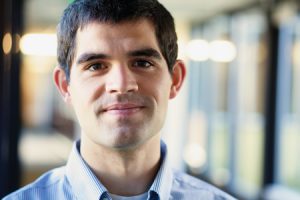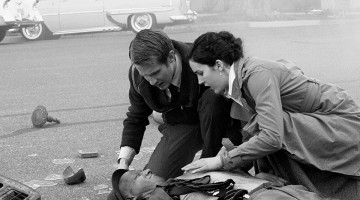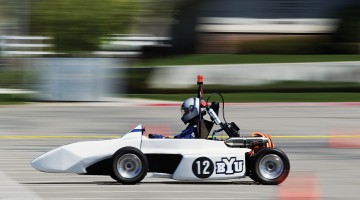For BYU’s newest Truman Scholar, success is tied to service.
 The underdogs were doing well. Facing their crosstown rivals in the Wyoming high school state tournament, the Trojans, led by quarterback Jason J. Despain, trailed by just one touchdown early in the fourth quarter. And they had the ball. Then things fell apart.
The underdogs were doing well. Facing their crosstown rivals in the Wyoming high school state tournament, the Trojans, led by quarterback Jason J. Despain, trailed by just one touchdown early in the fourth quarter. And they had the ball. Then things fell apart.
Of Despain’s five fourth-quarter passes, three were interceptions. The loss, nearly seven years ago, remains influential for Despain (’11), a BYU economics major who recently received a Harry S. Truman Scholarship. “Failing at something that was really important to me at the time definitely presented an opportunity to grow,” he says.
All those interceptions, Despain laughs wryly, did a number on his confidence, while generating humility and kindling a desire to improve his skills and find success. The experience was also the genesis of a personal research project—at his own initiative, not for a class—two years later when Despain was a BYU freshman.
Stewing about how to build confidence without sacrificing humility—both of which he saw as essential to success—Despain interviewed a half-dozen BYU professors and coaches. As he expected, his sources tended to define success as the fulfillment of potential. “But what I wasn’t expecting,” he recalls, “is that a lot of the people I interviewed then said, ‘And you’re more successful if you do it helping other people.’”
The surprise twist—service breeds success—coincided with another discovery: service reconciles confidence and humility. “When I help a person grow,” Despain wrote in a one-page summary of the project, “I am both more confident and more humble.”
Despain’s freshman research project has shaped him fundamentally—affecting both attitudes and aspirations. His future success, as he defines it now, has a distinct others-focused overtone. He hopes to fulfill his potential, he says, and “to do it for the benefit of other people.”
At BYU Despain has followed that pattern. He has mentored Provo elementary school students, coordinated a campus visit for Wyoming high school students, and volunteered at a Washington, D.C., soup kitchen. He has also found success, landing a summer job as press secretary for a Wyoming senator in Washington, D.C., and receiving the Truman Scholarship.
The Truman Scholarship offers up to $30,000 for graduate study to people who hope to make a difference in society through public service. One of 60 recipients nationwide, Despain plans to use the scholarship to study public policy, an arena in which economics professor James R. Kearl thinks Despain has the ability to contribute well.
“He listens carefully and respectfully and is tough minded,” says Kearl, who has employed Despain as both a teaching and research assistant. This summer, the pair is studying the U.S. ethanol subsidy program, helping Despain develop valuable research skills, says Kearl: “Good data and good data analysis frame policies so that people can make better rather than worse choices. We’re equipping him with the tools to do that.”
Despain has periodically sought accounting professor Earl K. Stice’s (BS ’81) perspective on educational decisions, and as Stice describes what makes Despain successful, the qualities are reminiscent of theprinciples Despain studied as a freshman: humility and confidence. “The thing that surprises me,” Stice says, “is he seems on the surface to be such a quiet young fellow, and yet he’s quietly aggressive. He makes things happen. He shows that you don’t need to be loud and flamboyant to make a mark in the world.”









